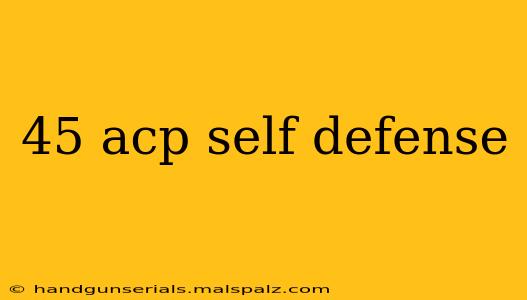The .45 ACP (Automatic Colt Pistol) cartridge has a long and storied history, renowned for its stopping power and substantial impact on targets. For decades, it's been a favorite among self-defense enthusiasts and law enforcement professionals alike. But is it the right choice for your self-defense needs? This guide delves into the advantages and disadvantages of the .45 ACP for personal protection, helping you make an informed decision.
The Advantages of the .45 ACP for Self-Defense
-
Stopping Power: This is arguably the .45 ACP's biggest selling point. Its large diameter and significant weight deliver substantial energy transfer upon impact, leading to a higher likelihood of stopping a threat quickly. The large, slow-moving bullet creates a significant wound cavity, increasing the chances of incapacitation.
-
Reliable Function: The .45 ACP is a mature cartridge with a proven track record of reliable function in a variety of firearms. Its robust design minimizes malfunctions, crucial in a high-stress self-defense situation.
-
Wide Availability: Ammunition is readily available, even during periods of high demand. This accessibility is a significant advantage for those prioritizing preparedness.
-
Effective at Close Range: The .45 ACP's characteristics shine at close-quarters engagements, the most common scenario in self-defense situations. The large projectile minimizes the impact of trajectory deviations at close range.
The Disadvantages of the .45 ACP for Self-Defense
-
Recoil: The substantial recoil can be challenging for some shooters, especially those with less experience or physical limitations. This can impact accuracy and the ability to quickly follow up on shots.
-
Capacity: Compared to smaller calibers, .45 ACP magazines generally hold fewer rounds. This means fewer opportunities for defensive engagement if the initial shots don't neutralize the threat.
-
Size and Weight: .45 ACP handguns tend to be larger and heavier than those chambered in smaller calibers. This can make concealed carry more challenging and potentially uncomfortable for extended periods.
-
Cost: .45 ACP ammunition is often more expensive than other calibers, impacting the cost of practice and range time, crucial for maintaining proficiency.
Choosing the Right Self-Defense Caliber: Beyond the .45 ACP
While the .45 ACP offers compelling advantages, it's crucial to consider your individual needs and capabilities. Smaller calibers like 9mm and .40 S&W offer higher magazine capacity and reduced recoil, making them attractive alternatives. Ultimately, the "best" caliber is subjective and depends on factors like:
-
Your Physical Strength and Shooting Experience: Can you comfortably handle the recoil of a .45 ACP?
-
Your Training and Proficiency: Consistent practice is crucial, regardless of caliber.
-
Your Lifestyle and Concealed Carry Requirements: Will the size and weight of the firearm be manageable for daily carry?
Conclusion: Informed Decision-Making for Self-Defense
The .45 ACP remains a potent self-defense cartridge. Its stopping power is well-documented. However, it's not a one-size-fits-all solution. Carefully weigh the advantages and disadvantages outlined above, consider alternative calibers, and prioritize extensive training and practice to ensure proficiency and safety. Consult with experienced firearms instructors and professionals to make an informed decision that aligns with your unique circumstances and capabilities. Remember, responsible gun ownership includes rigorous training and a deep understanding of firearm safety.

